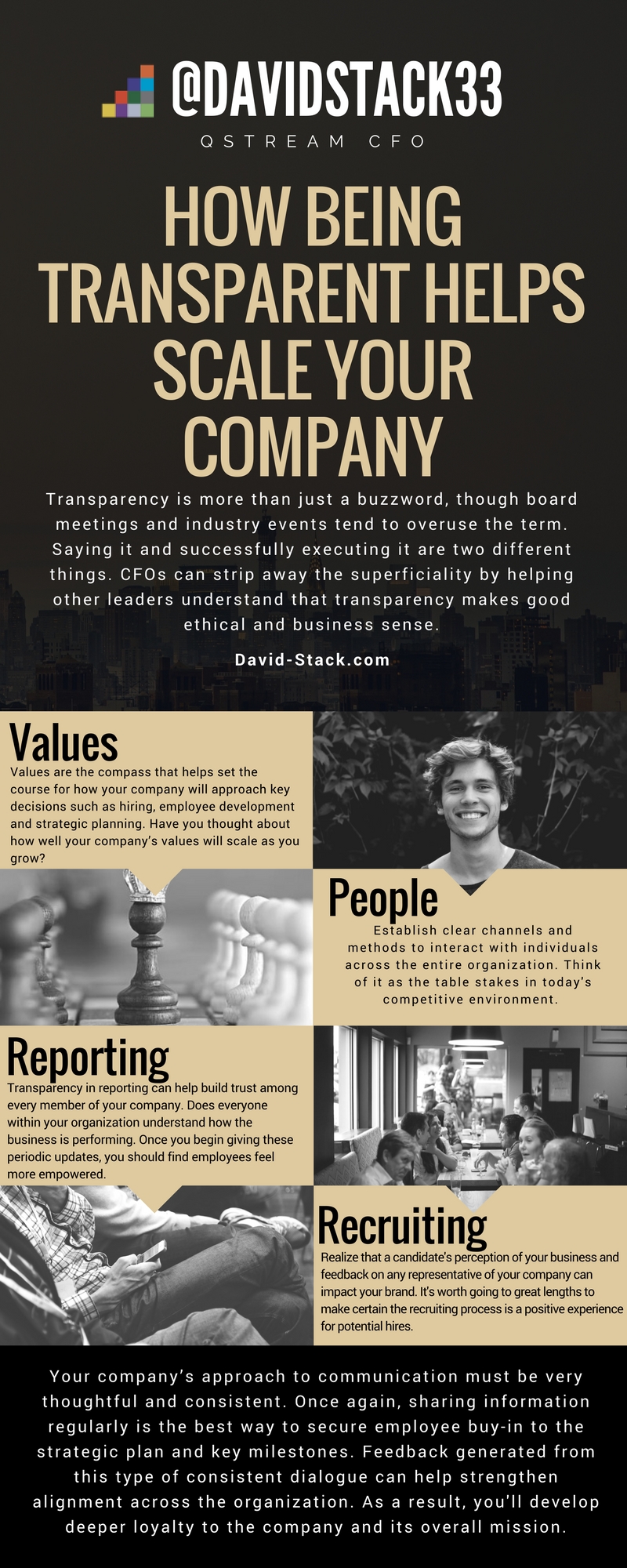Blog & News
Infographic: Mastering Time When Your Startup Needs You Most
The sooner you master time management in your startup, the better for your effectiveness as a leader. David Stack’s original article was published on Entrepreneur. Time management and prioritization is critical in a startup that is growing rapidly. It is essential that there is always a balance between the phase of the company and the amount of time and investment made in people and processes. From the CFO’s perspective, especially in the early stages, time is money certainly rings very true.

David Stack is on Twitter @DavidStack33
Infographic: How being transparent helps scale your company
David Stack’s original article entitled “How being transparent helps scale your company” was published by Entrepreneur. You can read that by following this link. In the following graphic, David gives a visual representation of how transparency helps a company build a foundation for success.

How Transparency Helps Scale a SaaS
Transparency is a critical element in any company, especially at a startup, to help support the scaling of the organization. As a CFO of several startups I have seen and contributed to the power transparency can have on growing organizations.
Values — This is the compass for a company that helps set the course for how it approaches key decisions like hiring, employee development, and strategic planning. Have you thought about how well your company’s values will scale as you grow? Having core values that can stand the test of time from the early days of the company’s inception to a meaningful and important growing organization should be your goal. There are so many business model, market, and execution challenges when you are growing your company, so you can’t spend precious time making material changes to your culture.
People — Transparency is essential from the CEO down through the organization so that employees understand what the expectations are and how success is measured. The benefit of having values that can support the scaling of the company is essential for developing talent within the organization. Establishing clear channels and methods for interacting with the entire organization is table stakes in today’s environment.
Recruiting — Establishing your company’s core values is the bedrock layer that must be firm before you begin to accelerate your hiring. Listing your values prominently across your web and mobile presence is critical to get alignment between the candidates you engage with and the company’s recruiting process. Even throughout the interview process it is important that all employees that interact with candidates embody the company’s values. In today’s environment the perception and feedback that candidates have when interacting with any representative of your company can impact your brand. Make sure you go to great lengths to ensure that the recruiting process is a good experience for all candidates.
Reporting — As stated in one of my earlier articles, reporting is a key area that transparency can be used to help build trust amongst everyone within the company. Does everyone within your organization understand how the company is performing, what metrics are important, and how are you doing when compared with your competition? Sharing this key information, on a regular basis, is the best way to better educate the company and reinforce how actual performance is progressing against short- and long-term goals. You should find that your employees feel more empowered and will actually strive to learn more about your company’s products and overall market opportunity.
Communication – It is important that your company’s approach to communication is very thoughtful and aligned across the board. The best way to buy in to the company’s strategic plan and key milestones is to share the information on a regular basis with the entire company. The feedback generated from this type of consistent dialogue can also help to strengthen alignment across the organization and develop deeper loyalty to the company and the overall mission.
Transparency is more than just a buzzword, though the term has seen over-usage, especially in board meetings and industry events. Saying the word and the successful execution of it can be mutually exclusive, but doesn’t have to be. CFOs can strip away at the superficiality of the verbiage by seeing that transparency makes for good ethical and business sense.
Managing Careers in SaaS Startups — CFO’s Perspective

Managing one’s career, especially within a startup, almost always falls upon the individual to look out for what is best. There are varying degrees of career development and support within startups, but in the early days there isn’t a lot of time or money allocated to help further everyone’s career. It always ‘pays’ to keep your career goals in mind as you dive into all the demands of your role within a fast-growing company.
As you make your career choices to either join a startup for the first time, or to take a different role within a startup, make sure you have a career roadmap/master career plan. Think through how these roles will deepen your experience and how that will help you progress towards your short and long-term career goals. What does success and achievement look like for you? Listing concrete goals and a timeline can help keep you focused. Determine what type of role and responsibility you strive to have over the next 1-3 years so that you have milestones along the way. And no success can be achieved in a state of stasis — that is to say: without a prolific learner’s mentality.
It’s table stakes to pursue graduate level courses that further your career along with professional seminars or conferences. It’s almost as important to get a better understanding of the other areas of the company outside of your own team or department. The deeper your knowledge of the company’s strategy, products, and the like, the more effective you can become at working cross-functionality. A great way to keep up with company specific items and your broader industry is to do things like attend lunch and learns that your company probably already has. Other great opportunities include attending any type of customer events that your company may sponsor.
As you look at joining a startup (or any company), do your research before you accept any interviews. It’s amazing how many candidates show up unprepared for interviews. I’ve had interviews with candidates who weren’t aware of who the primary competitors were, what the core functionality of the product is, etc. This sends a direct signal about preparedness and desire to work for the company.
At a minimum, understand who the investors or owners are, what product(s) the company sells, who their competition is, key characteristics of the market and opportunity, etc. Not only does this help you be more effective during the interview process, it will also help you at the offer evaluation stage.
As you are progressing along your career journey, make sure you are focusing on networking. A couple of no-brainer moves are to seek out mentors along the way that can help with critical decisions, like taking a role that is different than what you have done previously. I’ve been lucky enough to have great mentors who would focus most of their feedback on areas of improvement. It’s good to get reinforcement for what you are doing well, but most of your growth will come from improving your areas that need more attention and development. The discipline is moving from your comfort zone to drive the meaningful growth. Often times there are great potential mentors within your company. Another option that is often overlooked is seeking out advisors that have deep expertise in your specific area. Their years of great experience can turn out to be a wealth of knowledge as you progress along your career plan. Focusing on key relationships and allocating time to them in a more quality vs quantity approach tends to yield the best results.
Most importantly, as you continue to progress successfully along your career path, don’t forget to pay it forward when you can — that means recruiting, cultivating and mentoring talent. Since it’s not always easy or second nature for folks to ask for help, try to extend your help or wisdom when you have the opportunity. If you happen to be asked to be a reference for a company’s products or services, take the time to be thoughtful and add in a thorough level of detail about your experiences with that company. You will be surprised how valuable your experience and feedback will be for someone who hasn’t been through that experience yet.
The best way to pay it forward is to be open to sharing your time with folks that you may meet at industry or customer specific events. I’m often inclined to spend more time with folks that are passionate about their business and or their role and really want to further their career. Those folks tend to be aggressive about seeking out mentors and will come prepared with specific topics that they are seeking input and feedback on. If you can find a situation where there is great alignment, you can really help make an impact.
Managing a career path with upward mobility is like a fingerprint; the paths are all a little different. How you choose to get yourself from A to B in a SaaS startup depends on your function within the startups, what type of startup it is, and where you are in your career trajectory. There is no way to make 100 percent perfect choices in managing your career, but what I just covered will 100 percent help.
Follow David Stack on Twitter: https://twitter.com/DavidStack33

Mastering Time in a Startup for a CFO
Time management and Prioritization is critical in a startup that is growing rapidly. It is essential that there is always a balance between the phase of the company and the amount of time and investment made in people and processes. From the CFO’s perspective, especially in the early stages, time is money certainly rings very true.
- Overall Playbook- You should have an overall plan for each phase of your company as you progress from a startup to a “scale up” type of organization. The essential part of your playbook should be balanced. Determine the key employees, systems, and processes that you need to support each phase of the company’s growth. You only want to invest in key resources in the early stages, but you can’t be too short-sighted so that when growth accelerates, you aren’t able to properly support key projects. Not getting bogged down in minutia or over engineering processes, while being thoughtful, is critical in the startup phase.
- Leadership and Managing- It is important to establish a transparent management and leadership style. Prioritizing your time in your management approach is one of the most critical areas where time can be mismanaged. Tailor your approach based on the makeup of the team and how you plan to achieve your goals. Depending on the role and level of experience some folks need more frequent 1-on-1 meetings, others may be fine with less formal interaction and are more self sufficient.
- Recruiting- If there is an area as important as your strategy, it is recruiting the right players to your team. In the startup phase, when your staff is small, you must have folks who can execute in their core competency as well as many other areas. Each hire as you progress from the startup phase to a larger company is critical to ensure crisp execution. Getting the right hire who can meet operational needs today and grow as your company scales will minimize any future challenges to support continued growth. Growth also creates the need for more roles and specialization. Make sure there are constant dialogue and feedback with the team to best prepare for future growth and roles.
- Systems – It is essential that you have an internal systems roadmap for each phase of the company. It can limit the amount of your internal tech debt that you have to face in the future if you can deftly balance when to plan to upgrade your systems. Some systems, like CRMs, can scale from 1 user to thousands of users. Others like your Financial System / ERP can be scale-blockers for your company’s growth if you wait too long to plan for upgrades. At a minimum, make sure each system you implement or upgrade can easily integrate with your mission critical systems.
- Strategic Planning- You need to prioritize your bandwidth for strategic planning above all else. Implementing a regular cadence to meet and review your company’s strategy with the management team is essential. Ensuring that your strategic planning receives the proper attention from key stakeholders greatly increases your ability to execute.
- Meetings – Be known as the person who questions whether certain meetings are necessary or superfluous. Recurring meetings without set agendas and firm deliverables can easily turn into an inefficient time use for multiple people. Questioning what goals a specific meeting is meant to accomplish will be appreciated by all.
Though time is infinite, figuring out how to master it as a CFO is finite. The sooner you figure out how to navigate mastering time management in your startup, the better it is for the health of that startup, your employees, and your effectiveness as a leader.
David Stack: Infographic: Time Management For CFOs Working in Startups


David Stack: Mastering Time in a Startup via CFO
Time management and Prioritization is critical in a startup that is growing rapidly. It is essential that there is always a balance between the phase of the company and the amount of time and investment made in people and processes. From the CFO’s perspective, especially in the early stages, time is money certainly rings very true.
 1. Overall Playbook – You should have an overall plan for each phase of your company as you progress from a startup to a “scale up” type of organization. The essential part of your playbook should be balanced. Determine the key employees, systems, and processes that you need to support each phase of the company’s growth. You only want to invest in key resources in the early stages, but you can’t be too short-sighted so that when growth accelerates, you aren’t able to properly support key projects. Not getting bogged down in minutia or over engineering processes, while being thoughtful, is critical in the startup phase.
1. Overall Playbook – You should have an overall plan for each phase of your company as you progress from a startup to a “scale up” type of organization. The essential part of your playbook should be balanced. Determine the key employees, systems, and processes that you need to support each phase of the company’s growth. You only want to invest in key resources in the early stages, but you can’t be too short-sighted so that when growth accelerates, you aren’t able to properly support key projects. Not getting bogged down in minutia or over engineering processes, while being thoughtful, is critical in the startup phase.
 2.Leadership and Managing – It is important to establish a transparent management and leadership style. Prioritizing your time in your management approach is one of the most critical areas where time can be mismanaged. Tailor your approach based on the makeup of the team and how you plan to achieve your goals. Depending on the role and level of experience some folks need more frequent 1-on-1 meetings, others may be fine with less formal interaction and are more self sufficient.
2.Leadership and Managing – It is important to establish a transparent management and leadership style. Prioritizing your time in your management approach is one of the most critical areas where time can be mismanaged. Tailor your approach based on the makeup of the team and how you plan to achieve your goals. Depending on the role and level of experience some folks need more frequent 1-on-1 meetings, others may be fine with less formal interaction and are more self sufficient.
 3.Recruiting – If there is an area as important as your strategy, it is recruiting the right players to your team. In the startup phase, when your staff is small, you must have folks who can execute in their core competency as well as many other areas. Each hire as you progress from the startup phase to a larger company is critical to ensure crisp execution. Getting the right hire who can meet operational needs today and grow as your company scales will minimize any future challenges to support continued growth. Growth also creates the need for more roles and specialization. Make sure there are constant dialogue and feedback with the team to best prepare for future growth and roles.
3.Recruiting – If there is an area as important as your strategy, it is recruiting the right players to your team. In the startup phase, when your staff is small, you must have folks who can execute in their core competency as well as many other areas. Each hire as you progress from the startup phase to a larger company is critical to ensure crisp execution. Getting the right hire who can meet operational needs today and grow as your company scales will minimize any future challenges to support continued growth. Growth also creates the need for more roles and specialization. Make sure there are constant dialogue and feedback with the team to best prepare for future growth and roles.
 4.Systems – It is essential that you have an internal systems roadmap for each phase of the company. It can limit the amount of your internal tech debt that you have to face in the future if you can deftly balance when to plan to upgrade your systems. Some systems, like CRMs, can scale from 1 user to thousands of users. Others like your Financial System / ERP can be scale-blockers for your company’s growth if you wait too long to plan for upgrades. At a minimum, make sure each system you implement or upgrade can easily integrate with your mission critical systems.
4.Systems – It is essential that you have an internal systems roadmap for each phase of the company. It can limit the amount of your internal tech debt that you have to face in the future if you can deftly balance when to plan to upgrade your systems. Some systems, like CRMs, can scale from 1 user to thousands of users. Others like your Financial System / ERP can be scale-blockers for your company’s growth if you wait too long to plan for upgrades. At a minimum, make sure each system you implement or upgrade can easily integrate with your mission critical systems.
5.Strategic Planning – You need to prioritize your bandwidth for strategic planning above all else. Implementing a regular cadence to meet and review your company’s strategy with the management team is essential. Ensuring that your strategic planning receives the proper attention from key stakeholders greatly increases your ability to execute.
 6.Meetings – Be known as the person who questions whether certain meetings are necessary or superfluous. Recurring meetings without set agendas and firm deliverables can easily turn into an inefficient time use for multiple people. Questioning what goals a specific meeting is meant to accomplish will be appreciated by all.
6.Meetings – Be known as the person who questions whether certain meetings are necessary or superfluous. Recurring meetings without set agendas and firm deliverables can easily turn into an inefficient time use for multiple people. Questioning what goals a specific meeting is meant to accomplish will be appreciated by all.
Final Thoughts
Though time is infinite, figuring out how to master it as a CFO is finite. The sooner you figure out how to navigate mastering time management in your startup, the better it is for the health of that startup, your employees, and your effectiveness as a leader.
Follow David Stack on Twitter! – https://twitter.com/DavidStack33
David Stack: Infographic: 5 Commandments of Successful SaaS Startups

David Stack Infographic: 5 Growth Areas CFO’s Should Focus On


David Stack: Managing Growth in SaaS Startups From a CFO’s Perspective
Overview
Managing and supporting growth in a SaaS startup is one of the most critical and challenging aspects of the CFO role. As a CFO of several startups I have seen and supported rapid growth rates for these companies and implemented processes to help with long-term growth.
Here are several key areas you should focus your efforts on:
Reporting – It is essential that you have a regular monthly and quarterly reporting cycle. Even if your business is more quarterly driven, it is important you have a detailed monthly reporting cycle as well. In a startup that is growing rapidly, you can’t afford to wait every 90 days to react to emerging trends. In addition to standard financial statements, you must also track your unit economics (including life time value, cost of customer acquisition, magic number, etc. ) and know the sensitivity inside and out. These are the key levers that you will use to evaluate the effectiveness of your Sales, Marketing, and Product Development efforts.
Long Term Models / Sensitivity – You should go to great lengths to build long term financial models that are flexible and can be used as great tools to track your actual progress. By having a great reporting process in place, including key unit economic metrics, you can easily integrate those concepts into your financial model. This model should allow you to determine how more aggressive revenue growth plans will impact the investment required. The models should also clearly illustrate the sensitivity in your unit economics as you determine what level of revenue growth is reasonable for your business model. Another ancillary benefit is that by having a detailed financial model with key metrics, you can easily work with future investors to quickly understand your business.
People – There are several age old statements that apply here. Hiring someone smarter than you is a good policy to follow. Setting up a great recruiting engine is essential to hiring the best people. The recruiting process is an extension of your brand, so having a defined process is important so all candidates have a similar experience. The key item to manage during rapid growth periods is keeping the bar high on talent you hire and not succumbing to the pressure to fill open requisitions because you are behind on your budget. Holding out for the best talent and best culture fit will payoff on multiple levels.
Systems – If your startup is experiencing rapid growth that is expected to continue long term, it is critical that you have a roadmap for your internal systems. You should develop a plan for all key systems including CRM, ERP (Financials), and so on. The 2 key components to focus on here are integration between systems and costs. Determining in advance how each system you plan to purchase integrates with existing systems is hugely important. The other area of focus is on cost. Focusing on per user cost per year in a SaaS system is supercritical because your total cost can balloon as you grow and add employees who require additional licenses. Make sure you plan for success and that you are diligent about negotiating each SaaS application you purchase in the early stages of your company’s growth.
Strategic Planning – Your strategic planning process is the most critical to help ensure everything is aligned within your startup. Clearly communicating the strategy internally so that everyone is on the same page is crucial. You should also stay in lock step with your investors and BOD so that everyone is in sync. You also need to have a system whereby the key stakeholders review your strategy, updates are made as needed, and changes are communicated to everyone, etc.
Final Thoughts
Most importantly, the discipline of reviewing how actual results and programs are progressing vs stated goals with brutal honesty is key to a good process that can scale as you continue to manage aggressive growth targets. That, combined with a rigorous system of recruiting and reporting will get you and your company through accelerated growth cycles.
Follow David Stack on Twitter! – https://twitter.com/DavidStack33
